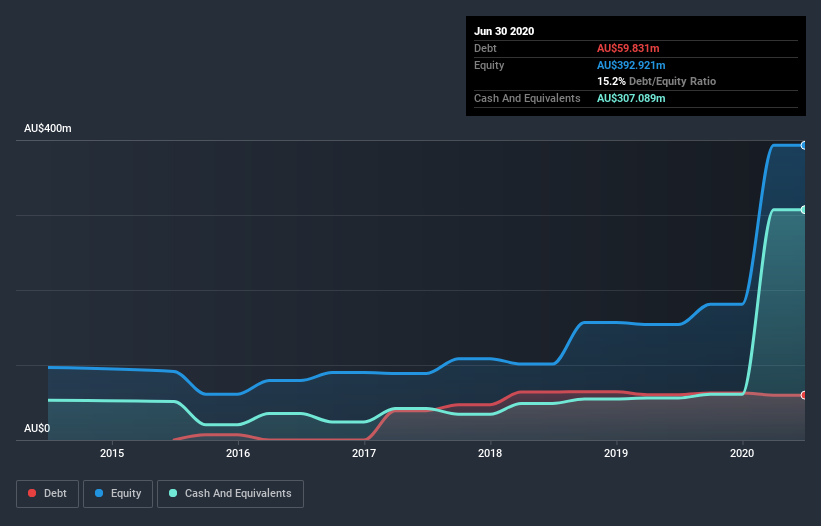Is IDP Education (ASX:IEL) A Risky Investment?

Warren Buffett famously said, 'Volatility is far from synonymous with risk.' When we think about how risky a company is, we always like to look at its use of debt, since debt overload can lead to ruin. As with many other companies IDP Education Limited (ASX:IEL) makes use of debt. But the more important question is: how much risk is that debt creating?
When Is Debt Dangerous?
Debt assists a business until the business has trouble paying it off, either with new capital or with free cash flow. If things get really bad, the lenders can take control of the business. However, a more frequent (but still costly) occurrence is where a company must issue shares at bargain-basement prices, permanently diluting shareholders, just to shore up its balance sheet. Having said that, the most common situation is where a company manages its debt reasonably well - and to its own advantage. The first thing to do when considering how much debt a business uses is to look at its cash and debt together.
See our latest analysis for IDP Education
How Much Debt Does IDP Education Carry?
The chart below, which you can click on for greater detail, shows that IDP Education had AU$59.8m in debt in June 2020; about the same as the year before. But it also has AU$307.1m in cash to offset that, meaning it has AU$247.3m net cash.
A Look At IDP Education's Liabilities
The latest balance sheet data shows that IDP Education had liabilities of AU$170.3m due within a year, and liabilities of AU$138.7m falling due after that. On the other hand, it had cash of AU$307.1m and AU$108.3m worth of receivables due within a year. So it actually has AU$106.4m more liquid assets than total liabilities.
Having regard to IDP Education's size, it seems that its liquid assets are well balanced with its total liabilities. So while it's hard to imagine that the AU$5.48b company is struggling for cash, we still think it's worth monitoring its balance sheet. Simply put, the fact that IDP Education has more cash than debt is arguably a good indication that it can manage its debt safely.
Fortunately, IDP Education grew its EBIT by 7.9% in the last year, making that debt load look even more manageable. The balance sheet is clearly the area to focus on when you are analysing debt. But it is future earnings, more than anything, that will determine IDP Education's ability to maintain a healthy balance sheet going forward. So if you want to see what the professionals think, you might find this free report on analyst profit forecasts to be interesting.
Finally, while the tax-man may adore accounting profits, lenders only accept cold hard cash. While IDP Education has net cash on its balance sheet, it's still worth taking a look at its ability to convert earnings before interest and tax (EBIT) to free cash flow, to help us understand how quickly it is building (or eroding) that cash balance. Over the most recent three years, IDP Education recorded free cash flow worth 57% of its EBIT, which is around normal, given free cash flow excludes interest and tax. This cold hard cash means it can reduce its debt when it wants to.
Summing up
While we empathize with investors who find debt concerning, you should keep in mind that IDP Education has net cash of AU$247.3m, as well as more liquid assets than liabilities. So is IDP Education's debt a risk? It doesn't seem so to us. The balance sheet is clearly the area to focus on when you are analysing debt. But ultimately, every company can contain risks that exist outside of the balance sheet. For instance, we've identified 2 warning signs for IDP Education that you should be aware of.
If, after all that, you're more interested in a fast growing company with a rock-solid balance sheet, then check out our list of net cash growth stocks without delay.
This article by Simply Wall St is general in nature. It does not constitute a recommendation to buy or sell any stock, and does not take account of your objectives, or your financial situation. We aim to bring you long-term focused analysis driven by fundamental data. Note that our analysis may not factor in the latest price-sensitive company announcements or qualitative material. Simply Wall St has no position in any stocks mentioned.
Have feedback on this article? Concerned about the content? Get in touch with us directly. Alternatively, email editorial-team@simplywallst.com.

 Yahoo Sport
Yahoo Sport 






































